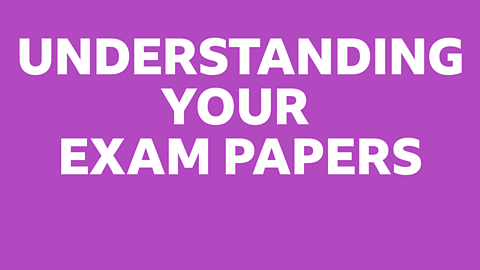This article was first published on 1 February 2019.
Different types of exam questions require different responses
You might be tempted to write everything you know when you come across a question from a topic you have revised well. But remember, if the question is only worth one mark, that’s all they can give you.
These tips will help you avoid wasting valuable time in an exam:
Go through the paper at the start, notice the type of questions being asked and the number of marks available
The marks available give you an indication of how much time to spend on the question
The easier questions will come at the beginning of the paper and will require short answers
Mr Moore explains to his class how to recognise the different types of questions that come up in an exam.
MR MOORE…Okay so here's something else that's going to help you in the exams. This is to do with going through your paper at the start, understanding what TYPES of questions are being asked, their different marks and therefore how much time you should be spending on them.
MR MOOREIt's about knowing what type of answer you should be giving to a particular question.
LEONAThe right answer, sir?
ZAKThe one it's just asked, sir?
MR MOORE I knew I should have gone into Banking.That's not exactly what I mean, Zak. Different types of question ask for different depths of response and mean you should spend different amounts of time on them in the exam.
GRACEBut how can we tell?
MR MOORELet me show you…On the whiteboard we see a multiple choice question page and also a page of ONE MARK questions.
Ok
MR MOOREEasier ones to see are one-mark questions and multiple choice. These will usually be towards the start of the paper. These are just asking you for information you can remember or that you can select from the source given to you. Simply write down the information you’re being asked to provide – don't waste time on anything else.
DARIAWell you can't write much because there's not much space sir.
MR MOORETHAT is another thing that helps you see how much information examiners are looking for.
MR MOORE looks at camera.LINE 11 01:20:00 MR MOOREAlthough that is less important for the higher mark questions- you can always ask for more paper.
MR MOOREThat takes us to…On the whiteboard an example of a TWO TO FIVE mark question…
MR MOORE… two to five mark questions. Now these ones are asking you for a little bit more detail. You can see that there is more space given to you after the question. These are asking you for information and THEN for you to explain your answer showing that you understand what it means. You will get marks for the knowledge and for your explanation. Keep it simple, keep it quick, keep an eye out for…
CLASSSpelling, Punctuation and Grammar
MR MOORERIGHT - SIX to TWELVE mark questions… And now we are getting into the questions you will find later on in the paper. But first… How long do you think you should spend on the one mark questions- Leona?
LEONANot much at all. Think about the answer. Write it down.
MR MOOREThe two to five mark questions?
LEONAA bit more time but keep it simple and quick?
MR MOORE… and these questions?
LEONAA very looooooong tiiiiime!
MR MOOREHmmm… well maybe not thaaat long but you're right. When you come to these higher-mark questions, you should give yourself enough time to answer them properly and enough time to check them for…
CLASSSpelling, Punctuation and Grammar.
MR MOORE…when you've finished.
GRACEYeah, wow, look at the space you get.
MR MOOREExactly. These are asking you to give a more detailed answer. They will be asking you about 1) your knowledge on the subject– 2) to show that you understand how that knowledge applies to the question… 3) to support your answer with evidence.
DANBut hang on sir, I've seen the English papers and those are like, 18 to 36 marks or something.
MR MOORERight, for some subjects, especially English, your paper is going to be made up of a couple of BIG mark questions. Those are where you really need to spend time. Keep an eye on how many marks you get for each answer and split your time up accordingly. SO! Any other questions?
ZAKWhat type of question do you mean sir?
MR MOOREHa ha ha. Very clever Zak.
Let's recap
Each paper that you sit will have different types of questions, which will require different depths of responses. The key is being able to recognise the types of questions being asked and know what response is required.
Different question types
1 mark/multiple choice - These are simply asking you for information you can remember or to choose an option given
2 - 5 marks - Here you need to recall the relevant information and then explain your answer
6 - 12 marks - These questions require you to remember information you have learned, use that information to answer the question and then support your answer with evidence
18- 36 marks (essay type questions) - These questions occur in certain subjects, for example English. For this type of question, note how many questions there are in the paper, and then split your time accordingly.

3 tips to help you understand your exam paper
Our exam veterans have some really helpful hints and tips on how to understand your exam paper.

Inside an examiner’s mind
Find out what an examiner is looking for when they mark your paper.

Revision: How to get organised
Advice on how to get organised with your revision.
